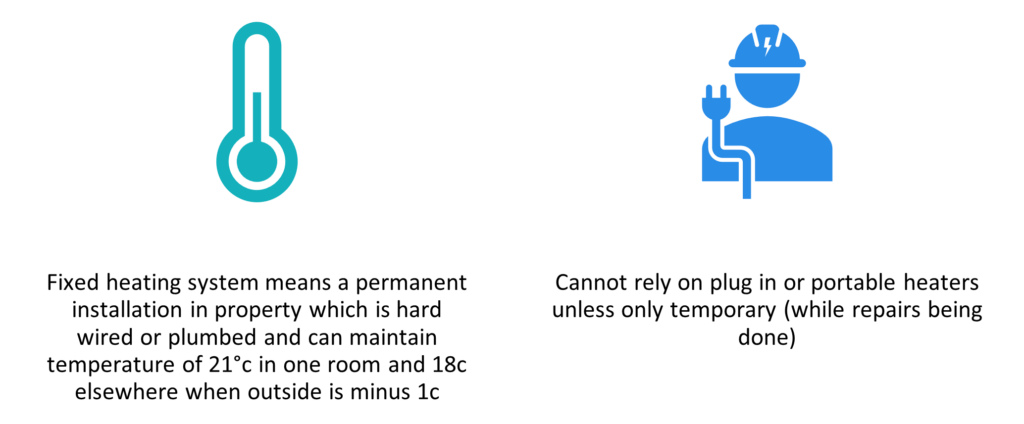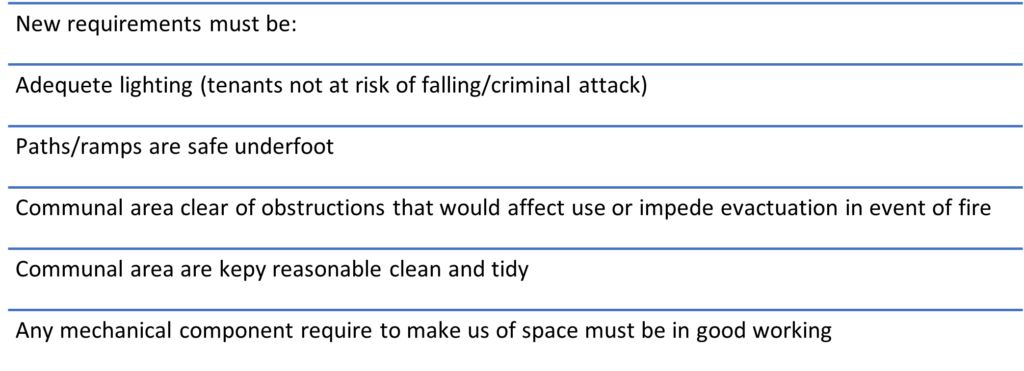
There have recently been new changes and updates to the repairing standards within the lettings industry
The latest updates are as followings:
- Condition of pipes supplying water for human consumption
- Electrical safety standards - installations for the supply of electricity and electrical fixtures, fittings, and appliances
- Installation of fixed heating
- Equipment for detecting fire and for giving warning of fire/suspected fire.
- Tolerable standard
- Type of emergency exit locks to be fitted in common/close doors in tenements.
- Equipment for detecting and giving warning of CO2 (in concentration which is hazardous to health)
- Provision for and safe access to good storage and food prep area/space
From March 1st, 2024, new regulations will be in place for the following:
- Lead
- Legionella
- Residual current device
- Other fuels
- Fixed heating system
- Safe kitchens
- Safe access to common parts
- Safe & secure common doors
- Consent to work on common parts
Lead – Lead in drinking water
- New guidance specifies the house needs to be free of lead pipes from stopcock to kitchen tap and if this cannot be confirmed a water quality test needs to be conducted.
- In the old regulations it clarifies that the main cause of lead in water the pipes leading up to or in the house and more common in house pre 1970 that have not had pipe, tanks or fittings replaced.
- A new standard of five micrograms per litre is required to be met by 2036.
- All private rented properties should not have any lead in the water, (this includes drinking water outlets, pipework to drinking water outlets, water storage tanks within the dwelling, water storage tanks in loft including common storage tanks in tank rooms or in roof space)
- Unless landlord cannot replace pipes due to lack of consent from other owners, lead pipes and tanks must be removed to be compliant.
Legionella –
- Legionella must be done before the property is first let.
- Testing should be done no more than 2 years.
Residual current devices – RCD’s
- RCD – a device to reduce the risk of electrocution and fore by breaking circuit in event of a fault.
- There must be one or more RCD fitted in consumer unit/fuse box.
- RCD is a sensitive safety device which switches of electricity automatically when there is a faulty
- Absence of this means property is not compliant with repairing standards.
- Requirements are met if property has at least one rcd and valid EICR.
Other fuels
- Other common types of fuel are Oil, liquid petroleum gas, solid fuel (coal or wood) and biomass.
Fixed Heating Systems

Safe Kitchens
- New standard will now include a requirement to have safe accessible food storage and food prep space in rented properties.
- Do not need to supply white goods.
- New builds and designing kitchens requirements already exist/in place.
Safe access to common parts

Safe & secure common doors
- Regulations and government guidance specifies locks need to allow someone to open them from inside with key, so the exit is not blocked in case of fire.
Consent to work on common parts
- Regulations include that a private rented flat in a tenement does not fail repairing standard if work needed to comply with standard cannot be conducted because majority of owners have refuse consent for work to be conducted.
- If a landlord cannot comply with standards, they need to have a satisfactory standard.
Extra Info
- Links below give more information and details on new regulations as well.
- https://scottishlandlords.com/events/scottish-letting-day/
